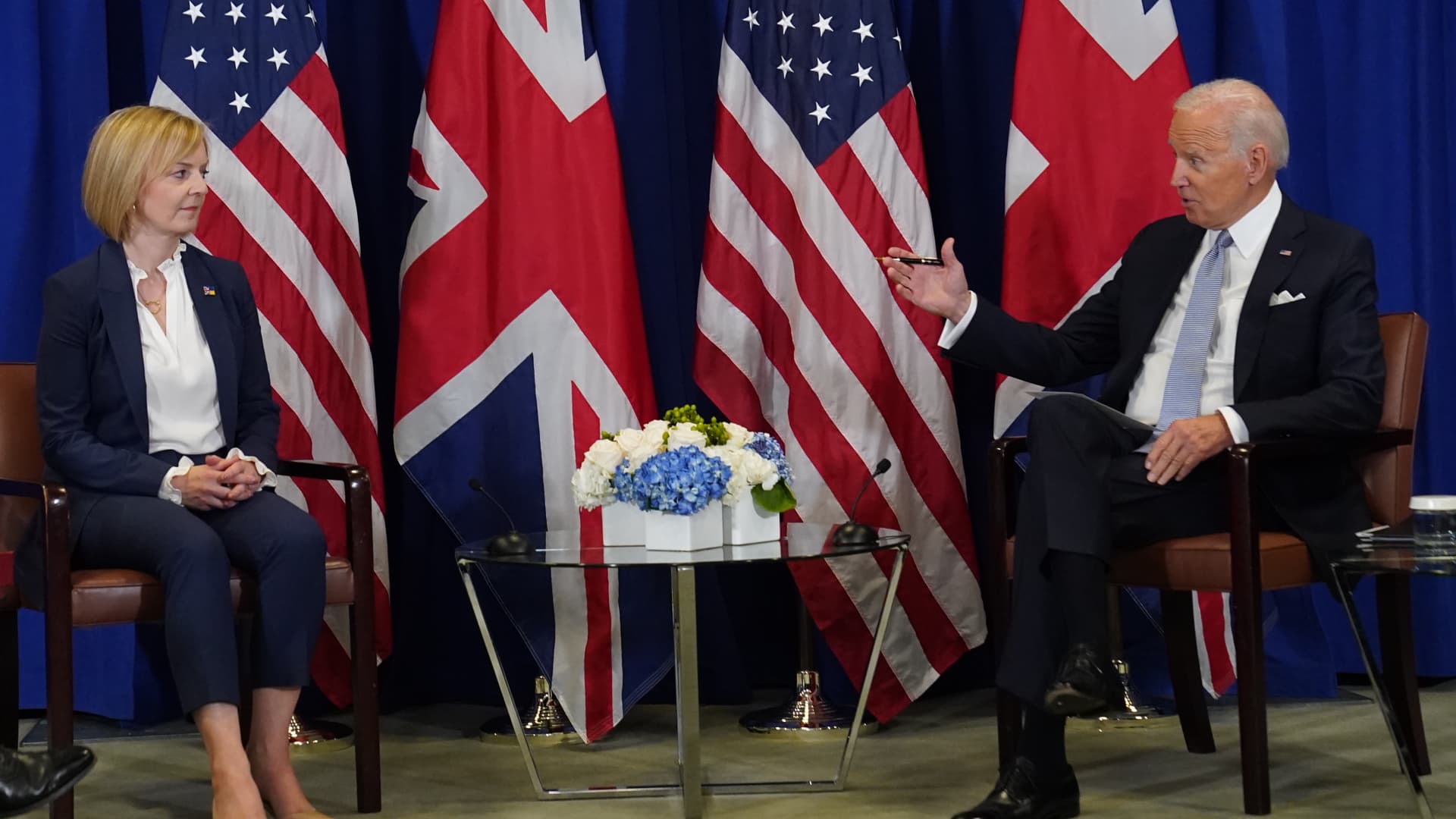British Prime Minister Liz Truss and U.S. President Joe Biden formally met for the first time at the United Nations General Assembly in New York City, following clashes in economic policy between the two leaders.
Wpa Pool | Getty Images
LONDON — The British government is set to announce sweeping tax cuts for businesses and the wealthy Friday, in a controversial mini-budget showcasing the lengths to which new Prime Minister Liz Truss is willing to go to overhaul U.K. economic policy even as it draws political ire.
Truss — whose “Trussonomics” policy stance has been likened to that of her political idols Ronald Reagan and Margaret Thatcher — has said she is willing to slash taxes at the top end of the economic spectrum in a bid to boost U.K. growth, in a strategy typically dubbed “trickle-down” economics.
But the approach, which comes as Britain faces its worst cost-of-living crisis in decades, has attracted criticism from both U.K. political opponents and Downing Street’s hereto closest international ally — the U.S. president.
Biden, in a tweet Tuesday, said he was “sick and tired of trickle-down economics,” adding “it has never worked.”
Downing Street said it was “ludicrous” to suggest the comment was aimed at Truss, according to the FT. The White House did not immediately respond to CNBC’s request for comment.
It came a day before the pair formally met for the first time in New York Wednesday, after which Truss tweeted that “the U.K. and U.S. are steadfast allies.”
What is expected in the mini-budget?
The U.K.’s growth-focused, mini-budget, which will be announced Friday by the U.K.’s new Finance Minister Kwasi Kwarteng, is expected to include plans to scrap planned corporation tax hikes, an end to the cap on bankers bonuses and a potential cut to stamp duty, the tax paid on house purchases.
Kwarteng also confirmed ahead of time Thursday that the government will reverse a recent hike in the taxes employees pay on earnings, known as National Insurance.
I don’t accept this argument that cutting taxes is somehow unfair.
Liz Truss
U.K. prime minister
Critics, including Britain’s opposition Labour party, have argued that such measures disproportionately benefit the wealthy. Higher earners will receive greater relative savings from the tiered NI levy than lower earners, for instance, while pensioners and those on benefits will be exempt from the savings.
Still, Truss said Tuesday she was willing to be unpopular if needed to kick-start the U.K. economy.
“I don’t accept this argument that cutting taxes is somehow unfair,” she told Sky News.
“What we know is people on higher incomes generally pay more tax so when you reduce taxes there is often a disproportionate benefit because those people are paying more taxes in the first place,” she added.
More detail is also expected on a previously announced cap on energy bills for households and businesses, which have been pushed higher following Russia’s war in Ukraine.
A ‘critical moment’ for U.K. economy
On Thursday, the central bank implemented its seventh consecutive rate hike, increasing its base rate by 0.5% to 2.25%. Sterling rose marginally on the announcement but remains at multidecade lows against the dollar.
Analysts have said that the announcement will mark a “critical moment” for the direction of the U.K. economy, with both the government and the central bank, which operate independently, seemingly pulling in opposite directions.
“The bank, looking to dampen consumer demand, and government, looking to increase growth, could now be pulling in opposite directions,” David Bharier, head of research at business group the British Chambers of Commerce, said in a note Thursday.
Questions have also been raised over how the policies will be funded, with tax cuts expected to lead to higher borrowing. Truss has argued that resultant growth will bring in more revenue which will cover those borrowing costs.
“The need to increase future borrowing coming alongside the ongoing tightening measures being undertaken by the central bank – this has the potential to continue to increase future borrowing costs,” Niall O’Sullivan, chief investment officer, multi-asset strategies, EMEA at Neuberger Berman, said.
Matthew Ryan, head of market strategy at global financial services firm Ebury, put those borrowing costs at an estimated £200 billion ($225 billion).
“With everything said and done, we estimate that the government’s spending package may well exceed £200 billion over the next two years, laying waste to the existing plans for fiscal consolidation,” he told CNBC via email.
Ryan noted that the government’s fiscal measures could “significantly lessen the possibility of a deep and prolonged UK recession,” but added that risks remain in terms of elevated inflation over the medium term and increases to the U.K.’s public deficit and net debt levels.
The Bank of England said Thursday that is was possible that the U.K. was already in a recession.
For all the latest Business News Click Here
For the latest news and updates, follow us on Google News.

